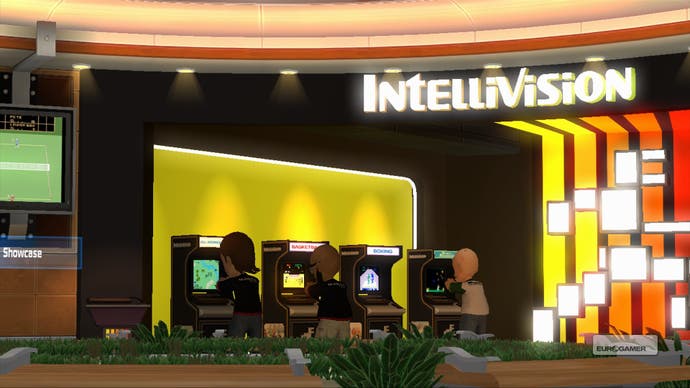Game Room
A trip down memory pain.
It's also important to target the best platforms. Why not delve into the untapped oceans of great Spectrum, Commodore 64 and Amiga games, for example? At the very least, the focus on arcade titles needs to be sharpened up dramatically. Getting SEGA, Taito, Capcom, Bally-Midway, Namco and other classic names of the era on board is essential. Only then will people look at Game Room as an exciting prospect, rather than a largely worthless selection of execrable rubbish at hilarious prices.
Certainly the potential is there. The whole thing looks great (or can look great, as Atari's showcase arcade demonstrates). The ability to create and customise your own virtual arcade is a nice touch, and allows you to specify the theme, decor, mascot and, crucially, which games you want in there.
A ranking system relating to good game performance rewards players with an array of unlockables, which can then be used to jazz up your room even more - something that adds a great deal more incentive than mere Achievements (though there are plenty of those to aim for as well, gamerscore whores).
Being able to guide your avatar around a friend's pimped-up arcade is also a great idea, as is being able to set each other challenges. The community and customisation features add a degree of substance to the concept, and it's easy to imagine frenzied competition surrounding an old favourite, and being able to settle old scores once and for all. Bragging rights never die, as King of Kong so beautifully illustrated.
But other features which had the potential to be excellent have been neutered by a tight-fistedness which will put many people off altogether. Take the 10-minute freeplay idea. On the face of it it's excellent to be able to try each game before you buy, but the concept is spoiled by forcing you to use that 10 minutes in one go. If you exit the game after a few seconds you can't go back and resume your freeplay time later - it's considered spent there and then.

It's also stupid to expect us to pay for games we've already bought on Xbox Live Arcade. It would not be difficult for Game Room to check whether you've previously purchased a game or not, especially given that it's a Microsoft product. Imagine the fuss if a new version of iTunes forced you to purchase songs you already owned. Why Microsoft thinks it can get away with this I'm not entirely sure, but the very hardcore retro gamer it is targeting with Game Room are the ones affected most.
There are few other missed opportunities too. Every game is steeped with history and anecdotes, and yet the best Game Room can come up with is a paragraph of text to accompany each title - no artwork, no interviews and no other intrigue to add value to the package.
With a keener focus on genuine classics and a little more attention to detail, Game Room has the potential to own the retro sector in a way that its competitors have failed: as a comfy retirement home for classic videogames. But with a largely rancid collection of games to date and a questionable pricing strategy, it doesn't exactly hit the ground running.
